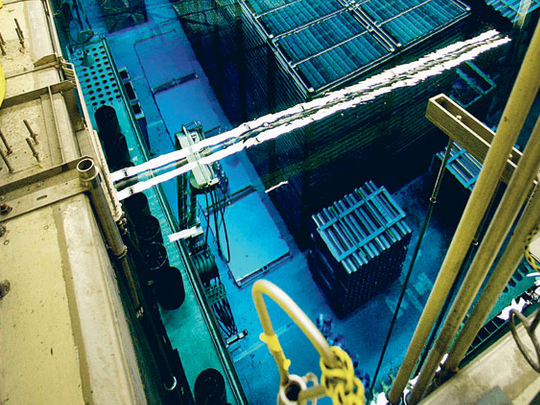
Abu Dhabi : The UAE's $20.4 billion (Dh74.9 billion) nuclear reactor deal will increase global demand for uranium, a New York consulting firm has said on its website.
The deal, recently awarded to a South Korean-led consortium, could also hike investment in uranium companies from entities backed by sovereign wealth funds, an analysis prepared by a Gerson Lehrman Group (GLG) expert revealed.
"The expansion of nuclear power in countries like Korea and the UAE will increase demand for uranium and investment in uranium companies, which implies that there will be greater competition for uranium resources, increasingly driven by sovereign wealth investment.
Costs
"Suppliers of reactors will need to provide fuel, or buyers will have to seek supplies on their own. Recent prices paid for such investments are higher than those reflected in equity markets due to the strategic nature of such investment and the relatively small contribution of fuel cost to overall cost of nuclear," the GLG analysis said.
Emirates Nuclear Energy Corporation (ENEC) last week chose the South Korean-led consortium to build four 1,400 megawatt reactors that will help the country fulfil its vision of driving growth on the platform of low-carbon, peaceful nuclear energy. Currently, the UAE imports natural gas to run many of its existing power plants.
The report stated that the UAE had multiple objectives in pursuing nuclear power, the topmost being that energy revenues would be recycled into hard asset domestic infrastructure, rather than being invested in risky financial instruments such as US debt.
The GLG also said petroleum would be better saved for export earnings, in the wake of rising oil revenues, rather than being used domestically and at low prices. The third motive, the GLG said, was the provision of clean energy that met global goals for reduction of carbon emissions while driving growth.
The GLG report said the reactor deal would help the global non-proliferation drive. "The UAE is setting a good non-proliferation precedent by foregoing uranium enrichment and spent fuel reprocessing, both of which could otherwise contribute to nuclear proliferation," the analysis stated.
In a separate report, GLG said the recent deal with the South Korea-led consortium was a logical move that had shown the UAE was "serious about making the right commercial and technical decision".
The consortium, led by Korea Electric Power Company (Kepco), won the bid on the certainty the Koreans had shown in terms of their recent manufacturing and construction experience for new reactors.
With the exception of China, South Korea has the highest number of reactor projects worldwide. There are six reactors with 6,500MW under construction in South Korea, with another four reactors expected in the next couple of years.












